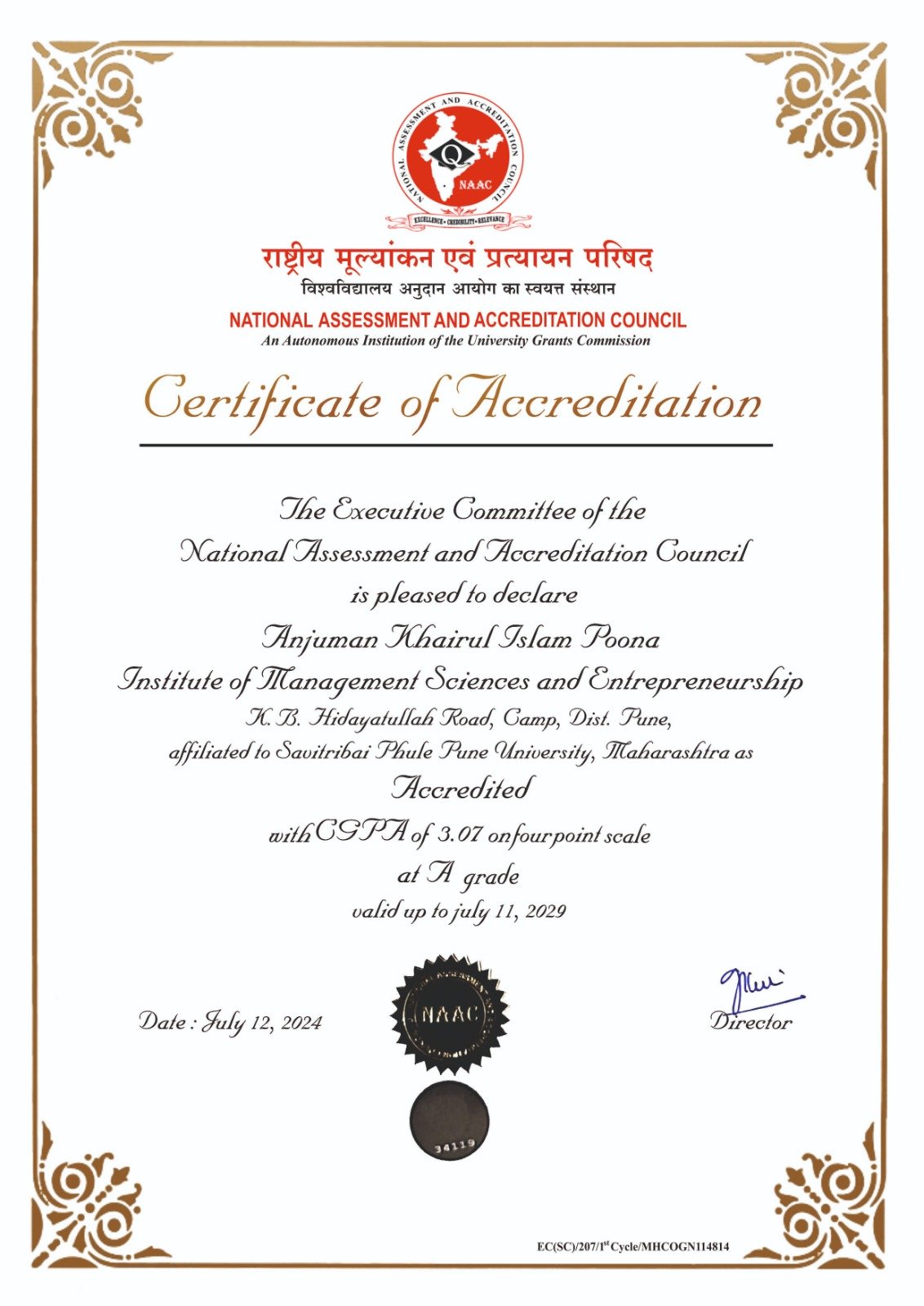MBA
Poona Institute of Management offers three Post
graduate Programs namely MBA, MBA-IT and MBA-HRD
The basic objectives of these courses are:
- To be a source of proficient young men and
women with essential knowledge, skills, values and attitudes ready to take
over managerial/administrative and technological job positions in
business, industry and the government.
- To facilitate transfer of relevant knowledge from
the field of management and information technology theory and practice to
the students.
- To hone the managerial skills of students.
- To develop the right kind of ideals and approach amongst students to function effectively in Managerial/ administrative positions.
MBA
The two year full
time Post Graduate Master of Business Administration program is an AICTE approved course. The revised MBA curriculum (2024 Pattern) of Savitribai Phule Pune University offers a dynamic, two-year, four-semester full-time program designed in alignment with the National Education Policy (NEP) 2020. Emphasizing Outcome-Based Education (OBE), the program adopts a Choice-Based Credit System (CBCS) and comprehensive grading to foster analytical thinking, leadership and global business acumen. With a diverse mix of core courses, electives, research projects and on-the-job training, students can specialize in Marketing, Finance, HR, Operations, Business Analytics, Agri-Business, or Pharma & Healthcare Management. The curriculum is tailored to develop well-rounded, ethical and industry-ready professionals. The course content of
the MBA program is designed by Savitribai Phule Pune University keeping in
focus the Industry requirements and giving students the much needed fillip to
accept the challenges of their chosen domain. The MBA program focuses on
imparting practical knowledge using teaching pedagogies such as case study
method, management games, experiential learning to name a few. Industrial visits, which are a part of the
co-curricular activities, are arranged for students to expose them to the
functioning of a company. Industry experts from different functional areas are
invited to interact with the students. Not only do the students hone their
functional skills, they are also groomed to have an all round personality.
Training programs to enhance the interpersonal skills of the students are a
regular feature at the institute. Students are encouraged to take part in
various intercollegiate completions and events to harness their strength and
realize their areas of improvement.
Pattern of MBA Program:
The Programme comprises of 4 semesters
and adopts the Choice Based Credit System (CBCS)
Course Types
1.
Core courses are the compulsory courses for all the students. Core courses are
of two types: Generic Core & Subject Core.
2.
Generic Core: This is the course which should compulsorily be studied by a
candidate as a core requirement to complete the requirement of a degree in a
said discipline of study. Therefore, Generic Core courses are mandatory and
fundamental in nature. These courses cannot be substituted by any other
courses. Such courses are also known as Hard Core Courses.
3.
Subject Core: A Core course may be a Subject Core if there is a choice or an
option for the candidate to choose from a broad category (grouping) of subjects
(specializations).
4.
Elective Course: Elective course is a course which can be chosen from a pool of
courses. It may be:
a) Very Specialized or advanced course focusing on a
specific aspect
b) Supportive to the discipline of study
c) Providing an extended scope
d) Enabling an exposure to some other
discipline/domain
e) Nurturing candidate’s proficiency/skills.
5.
Generic Elective: An elective course which is common across disciplines /
subjects is called a generic elective. ‘Generic Elective’ courses develop
generic proficiencies amongst the students.
6.
Subject Elective: A ‘Discipline (specialization) centric’ elective is called
‘Subject Elective.’ Subject Elective courses, in the Semester II, III and IV
are focused on a specialization.
7.
Research Methodology Courses: These courses are focused on various aspects of
Research. They include – Business Research Methods, Desk Research (DR) and
Field Project (FP) in Semester II, On The Job Training (OJT) in Semester III
and Research Project (RP) in Semester IV. DR, FP, OJT and RP shall be
specialization specific compulsory courses (subject core). BRM shall be a
generic compulsory course.
8. Massive Open Online Courses (MOOCs): Massive Open Online Courses (MOOCs) are such online courses which are developed as per the pedagogy stated in the AICTE regulation (2016) or equivalent; following the four-quadrant approach and made available on the SWAYAM platform of Government of India. Upto 40% credits are permitted through MOOCS. Any Course of 2 Credits can be taken in the form of SWAYAM / NPTEL MOOCS provided the student secures the certificate from SWAYAM / NPTEL. MOOCs from other platforms shall not be considered valid. MOOCS cannot be opted for in case of a 3-credit course.
Specializations offered: The following specializations shall be offered:
1.
Marketing Management (MKT)
2. Financial Management (FIN)
3. Human Resources Management (HRM)
4. Operations & Supply Chain
Management (OSCM)
5. Business Analytics (BA)
6. Agri -Business Management (ABM)
7. Pharma & Healthcare Management
(PHM)
Note:
1. There is no provision for MAJOR
and MINOR Specialization Combination.
2. Specialization shall be chosen at
the BEGINNING of SEM III.
3. Desk Research, Field Project,
On-the Job Training & Research Project shall be in the area of
specialization only. i.e. these courses are SUBJECT CORE COURSES.
4. Institutes may offer ONLY SELECT specializations based on industry needs, faculty strength & competencies, student demands, employability potential, etc.
5. Institutes MAY NOT offer a
specialization if a minimum of 20% of students are not registered for that
specialization.
6. The Institute MAY NOT offer an
elective course if a minimum of 20% of students are not registered for that
elective course



